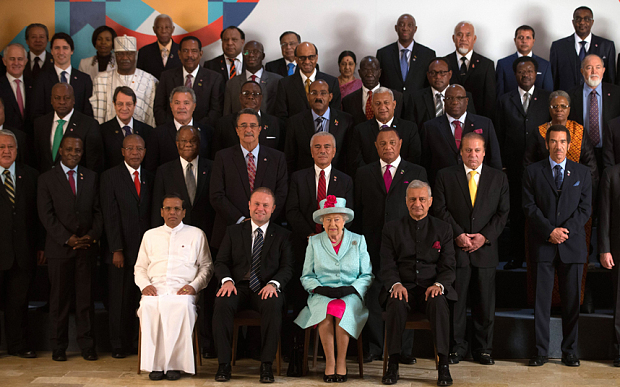Valletta, Malta – France’s president and the secretary general of the United Nations pleaded Friday at the Commonwealth summit for the world to unite and produce an ambitious agreement to combat climate change, with François Hollande saying “man is the worst enemy of man.”
Their call for action on the eve of a United Nations climate-change conference in Paris came as Prime Minister Justin Trudeau announced $2.65 billion over five years to help developing countries deal with climate change.
Hollande flew in to Malta for a special session on climate change at the Commonwealth summit, saying he very much wanted to attend the meeting to address a critical issue for the globe.Paris will have the eyes of the world once more when more than 150 heads of state and government gather Nov. 30 to try to reach a post-2020 agreement for reducing greenhouse gas emissions that cause global warming.
“It’s a duty for mankind to be bold in the days to come to reach an agreement, a binding agreement, a universal agreement. One that is ambitious,” Hollande told reporters at the Commonwealth summit.
“Man is the worst enemy of man. We can say it with terrorists. But we can say the same when it comes to climate. Human beings are destroying nature, damaging the environment and it is therefore for human beings to face up to their responsibilities for the future generations.”
The Paris conference is crucial, he said, because “we are defending our vision of mankind.”
While Hollande said leaders must reach a gritty and binding climate agreement in Paris, his fear is that even a few countries could block the process if they think “there are not enough guarantees or if they believe that some of the obligations will slow down their development.”
The French president didn’t identify a country by name, but Hollande has raised concerns in recent weeks about the United States, which is balking at any kind of climate framework that is a treaty and includes legally binding reduction targets as was the case with the Kyoto Protocol.
India, an emerging country with more than one billion people, has also been playing hardball in the lead-up to Paris, worried that agreeing to hard caps or absolute emissions reductions could hurt its developing economy in years to come.
Hollande also thanked Canada for its multi-billion-dollar commitment to help poorer nations fight climate change.
United Nations Secretary General Ban Ki-moon said “all the stars seem to be aligning in one direction” in the lead-up to the Paris conference, insisting it must produce a “good and ambitious, universal agreement.”
He cautioned that the world cannot again delay or postpone strong action to reduce greenhouse gas emissions. He called on political leaders to raise their ambitions and also urged citizens everywhere to demand more from their elected officials.
“We must take action. We have spoken a long time, at least 20 years, more than 20 years, and the science has made it plainly clear,” Ban said. “The leaders must show their leadership. They have been elected, they have been mandated by the people.”
He also specifically noted the financial commitments by Canada, France, Germany, United Kingdom, Japan and Australia to climate financing.
Trudeau’s announcement Friday at the Commonwealth summit will see Canada contribute $2.65 billion over the next five years to help developing countries reduce their emissions and adapt to climate change.
“I’m here today not just to say Canada’s back, but to show it,” Trudeau told fellow Commonwealth leaders.
The new funding amounts to a doubling of Canada’s so-called “fast-start climate financing” for developing nations.
Developed countries committed in the Copenhagen accord in 2009 to contribute $100 billion annually by 2020 from various sources to help developing nations deal with climate-change mitigation and adaptation.
The more advanced countries are now trying to hammer out a deal for the Paris conference on how to reach the climate-financing goal.
Canada’s new contribution announced Friday increases the country’s commitment from $300 million in 2016-17 to $800 million by the year 2020-2021.
The government says Canada’s new funding will help developing countries shift to low-carbon economies that are “sustainable and more resilient.”
The dollars will go to the poorest and most vulnerable countries that need support to respond to climate change, such as small-island developing states, Africa and the least-developed countries.
“We are convinced that Canada should do more to fight climate change,” Foreign Affairs Minister Stéphane Dion told reporters in Malta.
Dion said the money is not guaranteed to any country, so a developing nation such as India – which has a ministry of coal – is not assured funding, but it also won’t be disqualified if it has a project to reduce emissions or adapt to climate change.
“I’m very confident that all countries of the world will do their share,” Dion said. “It’s not an equalization payment. You’re not entitled to have it. It’s not a transfer.”
Following the Copenhagen summit in 2009, Canada announced $1.2 billion in fast-start climate financing over three years, up to the year 2012-2013, which supported projects focused on climate-change adaptation and increasing renewable energy in more than 60 countries.
In 2014, the federal government announced another $300 million for what is known as the Green Climate Fund. The fund is aimed at supporting projects, programs, policies and other activities to address climate change in developing countries.
The combined contributions, including the new money announced, will bring Canada’s total federal funding to more than $4 billion by 2020-21 to help developing countries fight climate change.
More than $10 billion US was pledged to the Green Climate Fund in 2014 by developed nations, including the $300 million from Canada. The fund is now operational and the first projects were recently approved. – Agencies




